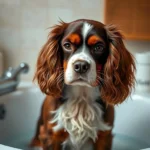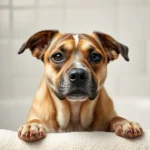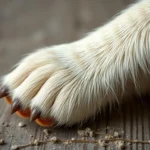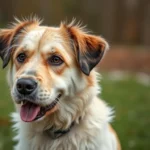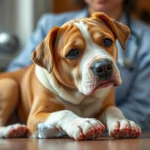
Reverse sneezing is a common phenomenon among dogs, particularly in breeds like French Bulldogs. Understanding this condition is crucial for owners who want to ensure the health and well-being of their pets. In this article, we’ll explore what reverse sneezing is, its causes, signs to look for, and what you can do to help your French Bulldog during these episodes.
Understanding Reverse Sneezing
What is Reverse Sneezing?
Reverse sneezing occurs when a dog rapidly pulls air into its nose instead of pushing it out like in regular sneezing. This involuntary action can sound alarming, often resembling a series of honking or snorting noises. Unlike regular sneezing, which typically clears irritants from the nasal passages, reverse sneezing is usually harmless and does not indicate an illness.
Causes of Reverse Sneezing
Several factors can trigger reverse sneezing in dogs. Common culprits include:
- Allergies: Dust, pollen, and mold can irritate your dog’s nasal passages.
- Irritants: Strong odors from cleaning products, perfumes, or smoke can provoke an episode.
- Excitement or Stress: Sudden changes in activity or environment can lead to reverse sneezing.
- Brachycephalic Traits: French Bulldogs, being brachycephalic (short-nosed), are predisposed to respiratory issues due to their unique anatomical structure.
Signs and Symptoms
To identify if your French Bulldog is experiencing reverse sneezing, look for the following signs:
- Honking or Snorting Noises: The characteristic sound of reverse sneezing.
- Extended Neck: Dogs often extend their necks and may appear to gasp for air.
- Rapid Inhalation: Quick, repetitive inhalations are typical during an episode.
Other symptoms that may accompany reverse sneezing include coughing, nasal discharge, or lethargy. If you notice these additional symptoms, it may indicate a more serious issue.
The Impact of Reverse Sneezing on French Bulldogs
Breed-Specific Concerns
French Bulldogs possess unique anatomical traits that make them more susceptible to respiratory conditions. Their short snouts and flat faces can restrict airflow, making them vulnerable to reverse sneezing episodes and other respiratory problems. Regular reverse sneezing may not be harmful, but it’s essential to monitor your dog for any changes in their breathing patterns.
When to be Concerned
While reverse sneezing is usually benign, specific signs warrant a visit to the veterinarian. If your French Bulldog displays any of the following symptoms, it’s time to seek professional help:
- Prolonged Episodes: If reverse sneezing lasts longer than a few minutes.
- Difficulty Breathing: Struggling to breathe or gasping for air.
- Lethargy: Unusual tiredness or lack of interest in activities.
- Cyanosis: A bluish tint to the gums or tongue.
Distinguishing between normal reverse sneezing and serious health issues is crucial for your pet’s well-being.
Immediate Response: What Should I Do?
Calming Your Dog
When your French Bulldog starts reverse sneezing, it’s essential to remain calm. Dogs can sense their owner’s anxiety, which may exacerbate their stress. Here are some techniques to help soothe your dog:
- Gently Rub Their Throat: Lightly massaging the throat can help them relax.
- Encourage Swallowing: Offer a small treat or water to encourage swallowing, which may help clear the airways.
- Create a Calm Environment: Reduce noise and distractions to help your dog feel secure.
Home Remedies
There are several safe home remedies you can try to alleviate reverse sneezing:
- Nasal Irrigation: Using a saline solution to clear nasal passages can help.
- Allergen Removal: Regularly clean your home to minimize allergens and irritants.
- Dietary Adjustments: Incorporating omega-3 fatty acids may support respiratory health.
Always consult your veterinarian before introducing new foods or supplements to your French Bulldog’s diet.
When to Seek Veterinary Care
Identifying Serious Conditions
Certain symptoms may indicate a more serious health issue that requires immediate veterinary attention. These include:
- Persistent Coughing: Continuous coughing that doesn’t improve.
- Wheezing or Whistling Sounds: Noises indicating restricted airflow.
- Fever: Elevated body temperature, suggesting an infection.
Veterinarian Examination
During a vet visit, expect a thorough examination, which may include:
- Physical Assessment: Evaluating your dog’s overall health and respiratory function.
- Diagnostic Tests: X-rays or allergy tests may be performed to identify underlying issues.
Being prepared for the vet visit can help ensure your French Bulldog receives the appropriate care.
Preventive Measures
Environmental Adjustments
To minimize reverse sneezing episodes, consider making some environmental adjustments:
- Reduce Allergens: Use air purifiers and regularly clean your home to minimize dust and pollen.
- Avoid Irritants: Keep your French Bulldog away from smoke, strong fragrances, and cleaning products.
Regular Health Check-Ups
Routine veterinary care is vital for maintaining your French Bulldog’s health. Regular check-ups allow for early detection of any respiratory issues. Additionally, ensure your dog is up-to-date on vaccinations and preventative treatments to support their overall health.
Living with a French Bulldog: Tips for Owners
Training and Behavior
Training can play a crucial role in managing reverse sneezing episodes. Here are some tips:
- Teach Commands: Commands like “calm” or “quiet” can help redirect your dog’s focus during episodes.
- Positive Reinforcement: Reward calm behavior with treats and praise to encourage relaxation.
Building a Supportive Community
Connecting with other French Bulldog owners can provide valuable insights and support. Online forums and local meet-ups can be great resources for sharing experiences and advice.
Conclusion
Understanding reverse sneezing is vital for French Bulldog owners. By recognizing the signs and knowing what to do when an episode occurs, you can help your dog remain calm and comfortable. Always be proactive about your French Bulldog’s health by monitoring their respiratory status and seeking veterinary care when necessary. With the right knowledge and support, you can enjoy a happy and healthy life with your beloved pet.
FAQs
What causes reverse sneezing in French Bulldogs?
Reverse sneezing can be caused by various factors, including allergies, irritants, and the unique anatomical structure of brachycephalic breeds like French Bulldogs.
Is reverse sneezing dangerous?
In most cases, reverse sneezing is not dangerous and typically resolves on its own. However, if episodes are frequent or accompanied by other concerning symptoms, consult your veterinarian.
How can I help my dog during a reverse sneezing episode?
Stay calm, gently rub your dog’s throat, encourage swallowing, and create a quiet environment to help alleviate stress during an episode.
When should I seek veterinary care for reverse sneezing?
If your French Bulldog experiences prolonged reverse sneezing, difficulty breathing, lethargy, or any other unusual symptoms, it’s important to seek veterinary care.
Can diet impact reverse sneezing episodes?
Yes, a diet rich in omega-3 fatty acids and free from potential allergens may support respiratory health and reduce the frequency of reverse sneezing episodes.
By understanding reverse sneezing and implementing the right strategies, you can ensure your French Bulldog remains healthy and happy.

